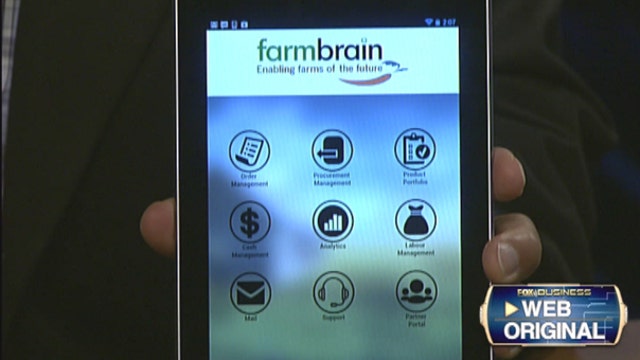Startup Looks to Grow Business for Farmers Through Mobility
SKC Group is a social tech company working to help farmers abroad and at-home. The New Jersey-based social venture just launched its second app, farmbrain, which is the U.S.-focused sibling to its freshmen app for Africa, grainschain.
The app’s goal is to connect customer and supplier, to educate the consumer and help farmers increase their market-base. SKC Group also landed its first State-side contract in time for the app’s debut.
While grainschain is a dual-service app that helps farmers in Uganda manage operations, farmbrain is geared to helping small-to-mid-size farms optimize their business for profit, as well as market reach.
“Mobility is becoming more and more ubiquitous worldwide,” SKC Group CEO Alex Cardona says.
Co-founders Cardona, Gaurav Kohli and Gundeep Singh, who have 30 years combined experience working in tech consulting for Fortune 500 companies, launched the tech- and science-driven supply-chain management company last year.
Market Drivers
At a macro level, Cardona says over the course of the next 35 years, Africa will fuel 50% of the population growth. He says such a global increase will create a greater demand for food. When looking specifically at Africa, where the median age is 18, there is “a huge window of opportunity to bring prosperity and work” to the continent, and in turn, economic growth and stability. For SKC Group, these facts represent a gap in the supply chain that can be filled with more scalable, effective and affordable mobile technology.
“Africa has untapped resources (or frontier markets),” Cardona says. “So when we looked at all those market drivers, in Africa, we found that there was opportunity to bring technology to help enable (up to 5,000) farmers.”
In the U.S., however, Cardona says they found the same upward trend in terms of population growth, but contrary to Africa, resources -- arable, forest and pasture land, energy and exports -- are actually depleting.
“Our idea is to bring this technology to [help the consumer] understand more about what they’re buying from their supplier,” Cardona explains. “And at the same time, help farmers … become more efficient in scaling their operation.”
How the Apps Work
The most recent feature updates to grainschain include a farmer portal and field map that let the user (farmer) keep contracts in order, map farms, calculate yield estimates and even make sure they are complying with regulations. Farmbrain takes these functions to the next level by enabling business-to-business as well as direct-to-customer interactions.
Where grainschain is linear and tabular in look and function, farmbrain is sleek and fluid.
When a farmer, or supplier, opens up the grainschain app, they will see several modules in which they can register their operation, monitor transactions, inventory goods, purchase materials and manage their cash transactions. These functions help farmers ensure there is consistency in pricing based on the quality of corn or other products they bring. The software also lends itself to enabling micro-financing.
Banks traditionally ask for credit reports or assets before lending funds, but as Cardona puts it, “these farmers don’t have that. They have maize.” With grainschain, farmers can show they’ve been regularly bringing in crops to obtain funding. Currently, SKC has 26 suppliers in Africa managing the app themselves, and about 3,200 farmers in total whose maize is passing through the app.
Farmbrain, on the other hand, serves to modernize the supply chain process by streamlining the ordering process through similar functions as grainschain. It also gives suppliers the ability to perform analytics, for example, on product performance and growing practices. Their first client is a baked goods company – through farmbrain, they are able to reach hundreds of customers rather than just a handful. The other neat function – that will likely reappear in an upcoming consumer-focused app – is a product portfolio, where customers can look at the actual inventory and place orders directly.
Looking Forward
Most recently, the co-founders turned a focus to supply chain solutions. Thus the idea for SKC was already incubating when a colleague approached with a project idea to create technology to manage farming operations in Uganda through the Joseph Initiative.
Cardona says the biggest challenge in developing technology for two different markets has been twofold: first, setting price points that are attractive to customers; and second, scaling the technology so that it can be applied to millions of operations.
Looking ahead, the bootstrapped project plans to discuss opportunities with outside investors in 2015, as they develop their third, consumer-centric app. Also in the pipeline is a humanitarian aid app that will help manage supply operations during disaster relief efforts.
The main thing, Cardona says is that “[we] help advance local and social causes, [while] helping improve business performance.”




















